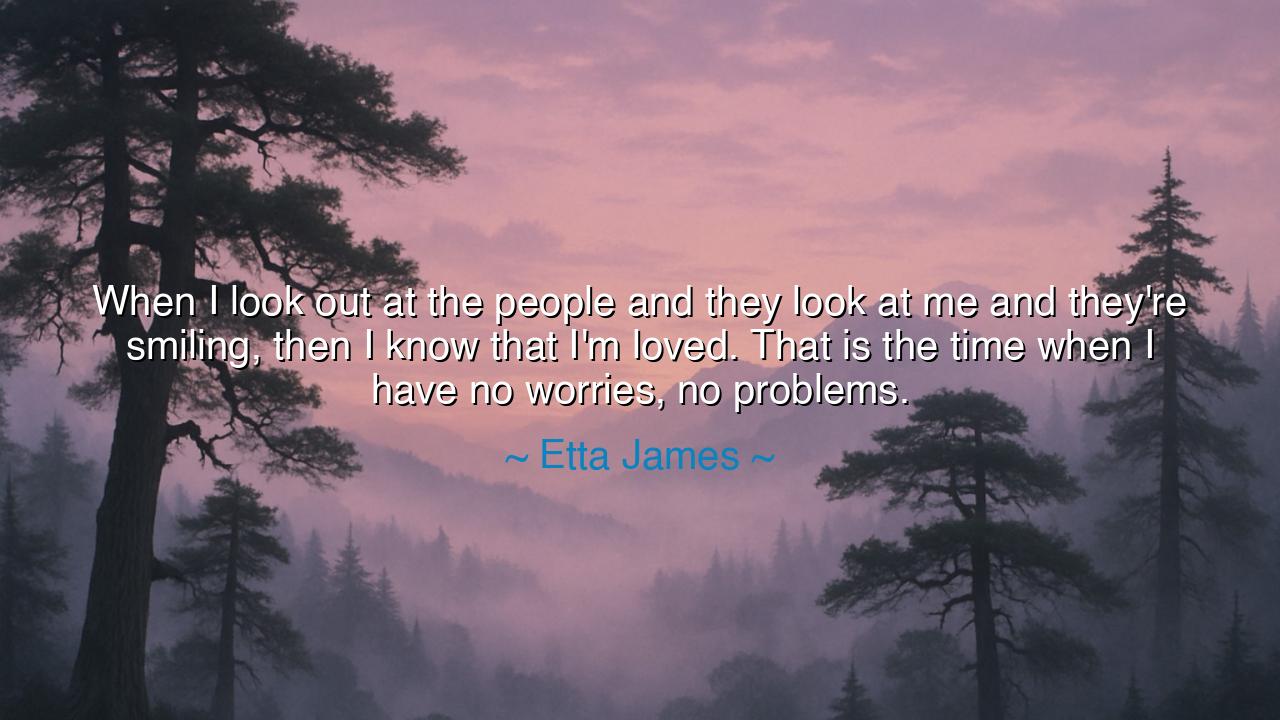
When I look out at the people and they look at me and they're
When I look out at the people and they look at me and they're smiling, then I know that I'm loved. That is the time when I have no worries, no problems.






The words of Etta James—“When I look out at the people and they look at me and they’re smiling, then I know that I’m loved. That is the time when I have no worries, no problems.”—carry the weight of a life steeped in struggle and yet redeemed by the power of human connection. They reveal the eternal truth that beyond fame, beyond wealth, beyond all the crowns and trappings of the world, what the human heart craves most is love. And in her case, that love was reflected back through the simple, radiant smiles of her audience. For in those moments, every chain of suffering falls away, and the soul rests in peace.
This quote springs from the stage, from the union of artist and audience, but its meaning stretches far beyond music. It speaks to the ancient longing of humanity: to be seen, to be cherished, to feel that one’s life has touched others. The smile of another is more than a gesture—it is a silent proclamation: “You matter. You are loved.” And when the heart is certain of love, then the storms of worry and the burdens of life grow light. Thus, Etta’s words embody the sacred exchange of giving and receiving, of pouring oneself out in art, in labor, in presence, and finding in return the affirmation of love.
History offers many echoes of this truth. Consider the story of the Greek orator Demosthenes, who once was mocked for his stammer and weakness of voice. Through years of struggle, he trained himself with pebbles in his mouth and the roar of the sea as his practice ground. When at last he stood before the people and delivered speeches that moved Athens, it was their smiles, their cheers, their gaze of admiration that told him his efforts had not been in vain. His confidence was not born merely from his own triumph, but from the reflection of love and respect in the eyes of those he served. So too with Etta James—the greatness of her gift was confirmed not by her own opinion of herself, but by the warmth she received from those who listened.
Etta’s life was not free of shadows. She battled addiction, hardship, and doubt. Yet when she stepped onto the stage and met the smiling faces of her listeners, the weight of her struggles was lifted. This reveals a deeper truth: that love does not erase our wounds, but it grants us a moment of freedom from them. When love surrounds us, we rise above fear, above shame, above pain. In such moments, the soul says, “I am enough.” And in that sacred space, worries dissolve like mist before the morning sun.
The ancients would say: a person cannot live by bread alone, nor by riches, nor even by talent. The true sustenance of the soul is love reflected back—not love abstract and distant, but love seen in eyes, in gestures, in smiles. For when the people smiled at Etta, they were not applauding merely her voice, but her very being. They declared that her struggles did not define her, that her essence was worthy of love. This is what gave her the strength to stand unbroken, even when life sought to bow her down.
What lesson, then, shall we take from this? That every soul has the power to heal another through something as simple as a smile. We often think love requires grand deeds, but Etta shows us that love is revealed in presence, in recognition, in the small but radiant exchange of joy between human beings. To offer a smile is to say, “You are not alone. You are valued.” And to receive such a smile is to feel, if only for a moment, that all burdens can be set aside.
Practically, we are called to live this teaching by giving smiles freely, not as shallow masks but as true offerings of kindness. When you meet a friend, a stranger, a weary soul in the street—let your face reflect warmth. When you stand before those who labor or perform, let your expression tell them they are loved. And when you yourself are troubled, seek the company of those whose smiles remind you of your worth. In this way, you will weave a net of love that catches not only others, but yourself as well.
Thus, Etta James, through her song and her words, reminds us of a truth older than time: that love is not an idea, but an experience reflected in the simplest of gestures. When we smile upon one another, we lift burdens, we dispel worries, we remind each soul that it belongs. And in such moments, fleeting yet eternal, we find what it means to live without fear, without sorrow—resting in the knowledge that we are loved.






AAdministratorAdministrator
Welcome, honored guests. Please leave a comment, we will respond soon